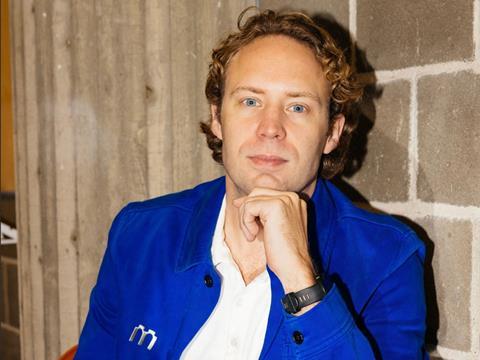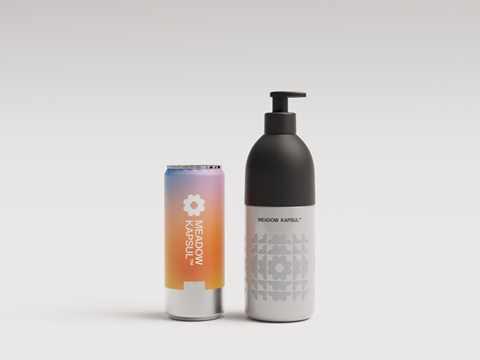
Meadow has developed an innovative process that aims to transform aluminium beverage cans into clean, intuitive refill systems. In four years, with the backing of can-producing giant Ball Corporation, the company has gone from initial concept to mass production. Meadow’s CEO and co-founder, Victor Ljungberg, gave us insights from inside the business in a recent conversation.
Let’s start with an introduction to Meadow – what kinds of products does your company produce, and why should our readers be interested in them?
Meadow has created a prefill solution - the MEADOW KAPSUL - out of the world’s most recycled (and most recyclable) container, the aluminum can. The MEADOW KAPSUL technology - which was awarded a Red Dot Design Award in 2024 - transforms the conventional aluminium container into a versatile pre-filled cartridge, paired with a reusable dispenser which brands can easily customise when licensing Meadow’s technology.
This massively expands the potential applications of the traditional aluminium container, bringing everything from personal hygiene and beauty and wellness products to food into the circular economy. It features a unique twist-to-open mechanism that makes the can easy to open with minimal effort, removing the hassle and mess of standard prefill packaging.
The technology is owned by Meadow, and then commercialised by one of Meadow’s strategic partners, such as Ball Corporation or C-Care, making it ready for widespread cross-market adoption.
According to The World Bank, over 2.1 billion tons of waste are produced globally every year, with only 13.5% recycled. This vast amount of waste overflows landfills, pollutes oceans (one truck load of plastic is dumped into the ocean every minute), harms wildlife, and is set to rise 70% by 2050.
Meadow is seeking to drive a global shift away from a dominant cause of this waste: linear packaging. Indeed, over 85% of packaging waste is attributable to the linear model due to its intrinsic single-use design.
There has to be a change if we want to meet any of the three Sustainable Development Goal indicators - ratified and adopted by all UN members - explicitly related to waste management, by 2030.
Meadow also operates within pre-existing supply and value chains, meaning that total reinvention of the existing packaging framework is not necessary for a wholesale replacement of linear to be achieved.
Instead, it emphasises the philosophy that optimisation of what is already available - repurposing the traditional recycling infrastructure - will yield a flexible, circular solution that works across multiple industry verticals.
Could you give an outline of the history of Meadow, from initial concept to mass production?
On 2020’s Earth Day - April 22nd - two Swedes (myself and Peder Stubert) and one American (Nick Paget) met at a co-working space in Stockholm and came to a shared realisation that the existing “solutions” for the waste crisis in packaging were failing on multiple levels.
Consumer-experience was largely neglected, supply-chain resilience deprioritised and scaling up of solutions deemed unfeasible. Within a month, we decided to take the leap from idea to business and began work on Meadow as a true replacement for linear packaging that didn’t forget about the end-user experience.
Contributing to the existing circular ecosystem is inherent in all parts of Meadow, including its name, which harkens to a flourishing, self-sustaining natural habitat.
Since idea generation in 2020, Meadow brought the concept to DRT Holdings - the largest global supplier of easy-open end system parts - and we developed a replacement for the traditional beverage can end, seeking to create one that enhanced versatility while maintaining the optimal characteristics of the established, customary end.
The technical development of the MEADOW KAPSUL was an iterative process, emphasising continuous improvement and consumer feedback. Thousands of hours were invested in testing and refining the product.
This culminated in the first MEADOW KAPSUL pilot launching in Spain at the end of 2024, followed shortly after by the announcement of a partnership with independent US contract manufacturer C-Care, through which Meadow could bring its technology Stateside and then with Ball Corp begin shepherding its unparalleled circular technology to the global market in 2025.

How do your cans perform from a carbon impact point of view? Have any independent LCAs been undertaken?
Due to aluminium’s inherent indefinite recyclability without quality degradation, Meadow’s cans are among the most sustainable packaging products available today: in Europe alone the overall recycling rate for aluminium cans has risen to 75% since 2014, leading to a 33% reduction in carbon emissions per can over that period.
As pertains to LCAs, thus far none have been undertaken - this will be done when Meadow’s clients are on the market (later this year) and able to participate in the process. Meadow has nonetheless sought to highlight the environmental effects of metal production throughout its entire life cycle, by collaborating with Antithesis, a UK-based LCA provider, with whom it supports impact assessment for brands through the use of a dynamic Greenhouse Gas calculator.
In January, Meadow announced a new partnership with Ball Corp. Could you introduce this news to our readers who may have missed it the first time around, and talk a bit about its key aims?
Ball Corporation, which is the leading global provider of sustainable aluminum packaging, announced a strategic partnership with - and minority investment in - Meadow. The partnership will support the production of fully recyclable aluminum cans as pre-filled cartridges for personal and home care products. Ball will supply cans and ends, which will be placed in reusable dispensers and brought to market as Meadow scales up operations.
Meadow’s partnership with Ball Corporation was predicated on a mutual understanding of the need to develop low-carbon solutions at scale, ones that accentuated reusability and recyclability.
Ball’s decades of experience as the leading global provider of sustainable aluminium packaging for beverage and personal care products meant that it was perfectly positioned to help facilitate Meadow’s scaling-up of operations. Easy access to cost-efficient, practical and recyclable pre-fill technology is no longer an unrealistic aspiration thanks to the partnership.
Ultimately, accelerating and facilitating brands’ transition to circular packaging across the globe, without any compromise on convenience to customers, is the ultimate North Star that connects and inspires Meadow and Ball.
We see plenty of exciting announcements about reuse and reusable packaging schemes, but relatively few ever achieve success at commercial scale. What does success look like for Meadow, and how are you planning to achieve it?
Meadow was founded to revolutionise the packaging industry while including existing stakeholders in the market - rather than competing with suppliers, it offers innovative, circular technology. Success in our eyes is based on the twin ambitions of reducing the impact of packaging waste and also enhancing consumer experience.
From the sustainability perspective, a quantifiable reduction in packaging waste across the verticals that Meadow operates in (personal care and beauty - with ambitions for further sectors) and a position at the forefront of circular economy enablement are mission-critical to us.
Central to this is capacity expansion and ensuring efficient pre-fill logistics are in place, in doing so, a competitive solution can then be distributed worldwide. Meadow’s partnership and integration with companies (such as Ball) that operate at vast scale, will be instrumental in fulfilling this objective.
Equally unlike previous ambitious contenders in the market, Meadow functions with a flexible business model, allowing brands to integrate their technology via in-house local production, or external partners under a licence for both pre-fill packs and dispensers, offering a unique practicality and adaptability.
It is the failure of the second intention though - making a packaging solution that is both sustainable and enjoyable for the end user – that really solidifies why you hear so few commercial-scale success stories in the reusable packaging sector.
Meadow is seeking to buck this trend, with thoroughly researched and tested insights. Having conducted three years of rigorous analysis and trials with consumers, examining the overlap between sustainability, convenience and a premium feel, Meadow is confident that the MEADOW KAPSUL will reward customers with an accessible, environmentally responsible and efficient product; one that updates and optimises existing consumer recycling habits, while ensuring circularity at scale.
If you liked this story, you might also enjoy:
The ultimate guide to the Packaging and Packaging Waste Regulation in 2025
How are the top brands progressing on packaging sustainability?
Everything you need to know about global packaging sustainability regulation in 2025
The key to increasing the use of reusable packaging in supermarkets














No comments yet